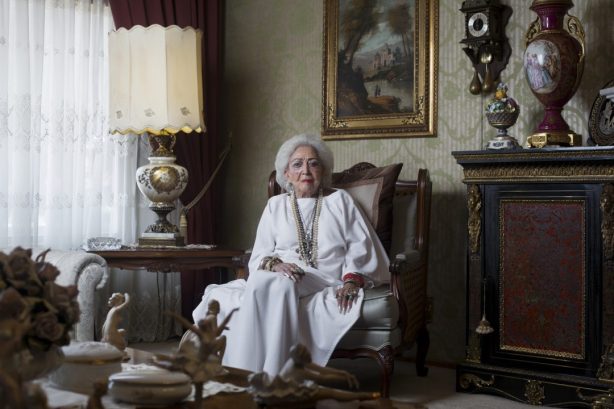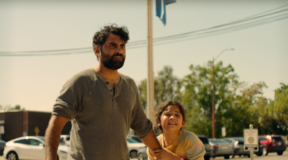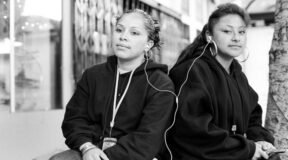All of us at Cine+Mas are super excited to co-present this lineup of films made in Mexico. Tickets are on sale now for the series kicking off June 14 and running through June 16, get em before they’re gone. roxie.com/hecho-en-mexico
Here’s the lineup from Roxie Theater.
MAMACITA
Friday, June 14, at 7pm

Director José Pablo returns to Mexico to fulfill his promise to his 95-year-old grandmother: to shoot a film about her life. An extravagant former beauty queen, Mamacita (Maria del Carmen Torrescano) established an empire of beauty and self-healing products and psychotherapy clinics for women in Mexico. But as José Pablo quickly discovers, all her efforts to help others could not heal the deep and dark wounds hidden within her own family. Sheltering behind the protective walls of her self-made kingdom, Mamacita surrounds herself with loyal servants: a gardener, chauffeur, chef, housekeeper and nurse, all who attend to her every need—but perhaps this is instead a self-made prison. With archival footage and interviews with his aunts and Mamacita herself, José Pablo begins to uncover the truth behind his grandmother’s questionable past, and must now face his own haunted history of growing up inside an of illusion of familial love.
Directed by José Pablo Estrada Torrescano. Mexico. 2018. 75min. In Spanish with English subtitles.
Tickets for Mamacita available here
M
Saturday, June 15, at 2pm
Director Eva Villaseñor in person for Q&A after the screening

M takes us on a relentless cinematic voyage straight into the mind of a troubled young man by means of courageous, raw and intimate cinematography and editing. A risky and challenging film, Eva Villaseñor’s documentary captures the frenzy of the delirious daily life of her brother, Miguel Ángel Villaseñor, a famous rapper from Aguascalientes known as Tankeone. With striking empathy and courage, this film reflects on the intense process of healing and transformation in the wake of drug addiction and suicidal despair, making this documentary a piece about human complexity in a country, Mexico, dominated by violence. Winner of the Best Mexican Documentary Award at the Festival Internacional de Cine de Guanajuato.
Directed by Eva Villaseñor. Mexico. 2018. 52 min. In Spanish with English subtitles.
UNA CORRIENTE SALVAJE (A WILD STREAM)
Saturday, June 15, at 4:15pm
Producer Tatiana Graullera in person for Q&A after the screening

Winner of the Best Mexican Feature Documentary at the Morelia Film Festival, the third feature by Spanish-born director Nuria Ibáñez (The Tightrope, The Naked Room) follows Chilo and Omar, who seem to be the only two men on earth. They live on a solitary beach in the desert-like landscape of Baja California and fish to survive. Selected by Film Comment as one of the best undistributed films of 2018, A Wild Stream is an engrossing portrait of the human condition, as well as an unusual and quirky bromance.

Directed by Nuria Ibañez. Produced by Tatiana Graullera. Mexico. 2018. 72 min. In Spanish with English subtitles.
Tickets for Una Corriente Salvaje available here
RECUPERANDO EL PARAISO (RECOVERING PARADISE)
Saturday, June 15, at 6:30pm
Director José Arteaga in person for Q&A after the screening
Located on the coast of the state of Michoacán, Santa Maria Ostula, like many other indigenous communities in Mexico, suffered great violence from organized crime. The citizens lost their land to cartels and businesses wanting to exploit their natural resources. They suffered greatly from intimidation and violence. Some were killed. Many leaders of the community decided to move away. In 2009, a group of Ostula’s citizens decided to reclaim some of the land that organized crime and local leaders with the help of the government had taken. They founded the town of Xayakalan. However, by 2011, the community experienced a steep increase in violence. Over the next 3 years, most of the citizens were forced to leave Xayakalan because of the violence, disappearances and murders that ensued. This all changed in 2014, when a large group of citizens returned to Xayakalan with armed self-defense groups from Michoacán. Mexican citizens are forbidden from carry firearms, yet the Mexican Constitution grants self-defense rights to indigenous communities. The citizens were ready to fight to guarantee their security. Now able to defend themselves, the community reclaimed their land and began reconstruction of their village. Recovering Paradise documents the armed resistance of the indigenous Santa Maria Ostula community and their struggle to reestablish law and order in their homeland.

Located on the coast of the state of Michoacán, Santa Maria Ostula, like many other indigenous communities in Mexico, suffered great violence from organized crime. The citizens lost their land to cartels and businesses wanting to exploit their natural resources. They suffered greatly from intimidation and violence. Some were killed. Many leaders of the community decided to move away. In 2009, a group of Ostula’s citizens decided to reclaim some of the land that organized crime and local leaders with the help of the government had taken. They founded the town of Xayakalan. However, by 2011, the community experienced a steep increase in violence. Over the next 3 years, most of the citizens were forced to leave Xayakalan because of the violence, disappearances and murders that ensued. This all changed in 2014, when a large group of citizens returned to Xayakalan with armed self-defense groups from Michoacán. Mexican citizens are forbidden from carry firearms, yet the Mexican Constitution grants self-defense rights to indigenous communities. The citizens were ready to fight to guarantee their security. Now able to defend themselves, the community reclaimed their land and began reconstruction of their village. Recovering Paradise documents the armed resistance of the indigenous Santa Maria Ostula community and their struggle to reestablish law and order in their homeland.
Directed by José Arteaga and Rafael Camacho. Mexico, 2017. 72min. In Spanish with English subtitles.
Tickets for Recuperando el Paraiso available here
TITIXE
Sunday, June 16, at 4pm
Main subject Yolanda Velasco in person for Q&A

The last peasant of a family has died and with him, all wisdom to till the soil has been lost. Without experience, his daughter and granddaughter will attempt a last traditional harvest to try to convince Grandma, the widow of the peasant, to keep their plot of land. Together they will uncover the leftovers (locally known as the titixe) of this man and his world: a mourning tree, dancing sprouts, the language of clouds, ghosts, stories and the endless menace of losing the crops to a tempest. This is an intimate mosaic of the last harvest of a Mexican family, in a country that has forsaken its rural origins.

Directed, photographed, edited and produced by Tania Hernández Velasco. Mexico. 2018. 62 min.
Tickets for Titixe available here
EL SEMBRADOR (THE SOWER)
Sunday, June 16, at 6pm
Director Melissa Elizondo in person for Q&A

Bartolomé, a teacher in a multigrade school on the mountains of Chiapas in Mexico, knows well that pedagogy is not based on textbooks and cannot fit behind the four walls of a classroom. A true sower of knowledge unravels his philosophy and method and becomes a beacon of hope for the creation of a humanistic model of education based on curiosity and love for the outside world. Award for a Feature-Length Documentary Directed by a Woman, Audience Award for Mexican Feature-Length Documentary and Guerrero Press Award for Mexican Feature Length Documentary at Morelia International Film Festival.
Directed by Melissa Elizondo. 2018. Mexico. 85min. In Spanish with English subtitles.








